
George Glenn Jones was an American musician, singer, and songwriter. He achieved international fame for his long list of hit records, including his best-known song "He Stopped Loving Her Today", as well as his distinctive voice and phrasing. For the last two decades of his life, Jones was frequently referred to as the greatest living country singer. Country music scholar Bill Malone writes, "For the two or three minutes consumed by a song, Jones immerses himself so completely in its lyrics, and in the mood it conveys, that the listener can scarcely avoid becoming similarly involved." Waylon Jennings expressed a similar opinion in his song "It's Alright": "If we all could sound like we wanted to, we'd all sound like George Jones." The shape of his nose and facial features earned Jones the nickname "The Possum".

50 Years of Hits is a country album by George Jones who was signed to Starday Records in 1953, released his first singles in 1954, and had his first hit with "Why Baby Why'" in 1955.

Friends in High Places is an album by American country music artist George Jones, released in 1991 on the Epic Records label. It was produced by Billy Sherrill.

Ladies' Choice is an album by American country music artist George Jones, released in 1984 on the Epic Records label. It was composed largely of duets with female artists.
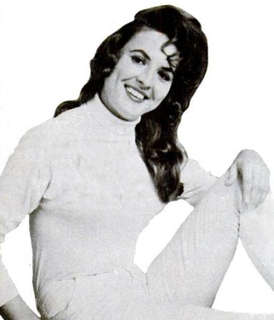
Melba Montgomery is an American country music singer. She is best known for her duet recordings in the 1960s with country music star George Jones and later Charlie Louvin. Her brother is the famous country music songwriter, Earl "Peanutt" Montgomery.

I Wish Tonight Would Never End is an album by American country music artist George Jones. It was released in 1963 on the United Artists record label.
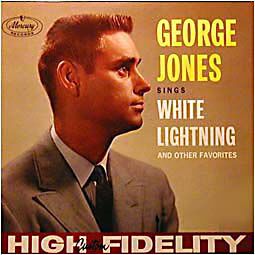
White Lightning and Other Favorites is the seventh studio album released by George Jones on May 26, 1959. Its title track "White Lightning" was a #1 Country hit in 1959.
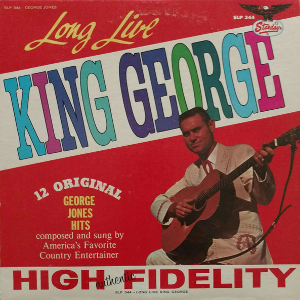
Long Live King George is a 1965 country music album released by George Jones. The album was long thought to be a studio release, however, it is a late Starday Records compilation of Jones recordings throughout the mid to late-1950s.

Grand Ole Opry's New Star is the debut studio album released by George Jones in November 1956 with Starday Records. Produced by Jones' manager Pappy Daily, the album was recorded during early sessions in 1954, throughout 1955, and other sessions in 1956. It is also the first album to be released on the Starday label, a label only four years old.
"We Must Have Been Out Of Our Minds" is a song made famous as a duet by country music singers George Jones and Melba Montgomery. Originally released in 1963, the song became a Top 5 hit on the Billboard Hot Country Singles chart and a country music standard.

"Why Baby Why" is the title of a country music song co-written and originally recorded by George Jones. Released in late 1955 on Starday Records and produced by Starday co-founder and Jones' manager Pappy Daily, it peaked at 4 on the Billboard country charts that year. It was Jones' first chart single, following several unsuccessful singles released during the prior year on Starday.
"White Lightning" is a song written by the rockabilly artist J. P. Richardson, best known by his stage name, the Big Bopper. The song was recorded by American country music artist George Jones and released as a single in February 1959. On April 13, 1959, Jones' version was the first number-one single of his career. The song has since been covered by numerous artists.

"(I'm a) One-Woman Man" is a song co-written by American country music artist Johnny Horton and Tillman Franks. It was originally released as a single by Horton in 1956, whose version peaked at number 7 on the Billboard Hot Country Singles chart. The song was twice recorded by American country music artist George Jones: first released on the album The Crown Prince of Country Music retitled "One Woman Man" in 1960, and later as "I'm a One Woman Man" released in November 1988 as the first single from his album One Woman Man. It peaked at number 5 on the Billboard Hot Country Singles chart in early 1989 and it would be his final Top 10 solo hit. His final appearance on the Top-10 country singles chart arrived a year later as part of a duet recording with Randy Travis. In spite of the lack of radio hits as the 1990s dawned Jones remained a popular concert draw for the next two decades and continued to release original recordings into the mid 2000s.
George Jones Sings His Greatest Hits is an album by George Jones, released on Starday Records in 1962.
"Color of the Blues" is a 1958 country song written by George Jones and Lawton Williams and released by Jones on January 15, 1958.
"Seasons of My Heart" is a song written by George Jones and Darrell Edwards. The song was released as the b-side to the #4 hit "Why Baby Why" in 1955. The song was also recorded by Johnny Cash and, released in 1960, it became a #10 hit.
"Did I Ever Tell You" is a duet by American country singers George Jones and Margie Singleton on their 1962 duet album, Duets Country Style. It was released as a single in 1961, peaking at number 15 on the 1961 Billboard Hot Country Songs singles chart.
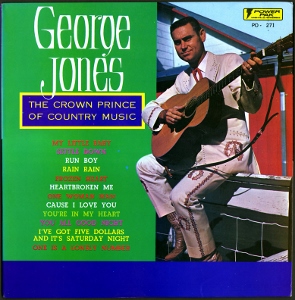
The Crown Prince of Country Music is the 1960 country music studio album released by Starday Records of previously unissued recordings released in January 1960. It was Jones' eighth studio LP release. The album's original release, like the reissue edition, did not chart.
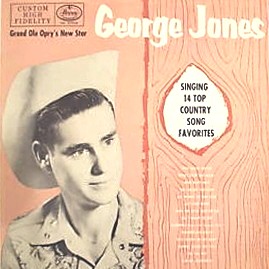
George Jones Sings is the fourth studio album released by George Jones in May 1957. The album was Jones' fourth studio LP release, after his marginally successful debut album the previous year. The album didn't chart well; however, it plays many of his best early recordings.
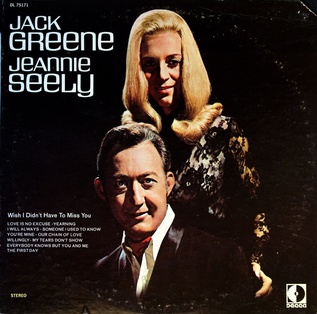
Jack Greene, Jeannie Seely is a studio album by American country music artists Jack Greene and Jeannie Seely. It was released in January 1970 on Decca Records. The album was produced by Owen Bradley and Harry Silverstein. The album included the duo's first major hit single together, "Wish I Didn't Have to Miss You". Their self-titled studio album reached peak positions on the Billboard country albums chart upon its initial release.













